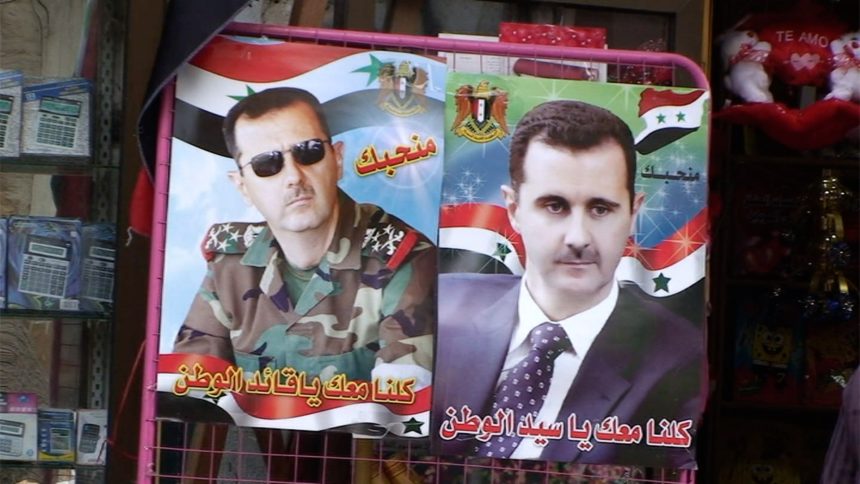First published in the NASGP Newsletter in December, 2019

Bashar al Assad, President of Syria, Damascus, April 2011
In 2011, Hamza was a young Syrian doctor learning German in the hope of going abroad for specialist training. Then the civil war broke out and he opted to stay in Aleppo, operating in makeshift hospitals on the people wounded by collapsing buildings, by barrel bombs, by snipers. Five years later government forces, backed up by the Russians, were one street away. Reluctantly, he and his team accepted last-minute deal brokered by Turkey and Russia to permit them to leave, and so to live.
We know how normal life choices shrank to survival in rebel-held East Aleppo because Waad al-Kateab, a young journalist who became Hamza’s wife, was there with her camera. She gave birth in besieged Aleppo and the film is for her daughter, Sama. So she will be able to understand why her parents made the choices they did. And so that we too can understand.
Hospitals are protected under international humanitarian law. Yet, the Syrian regime targets anywhere that people may congregate. We see the dust clouds arising from bombing throughout the city. Rudimentary hospitals are created underground where they may not be detected. People are safer from the bombs there, but not from the chlorine gas which is heavier than air and seeps into the cellars where they operate in cramped space with limited medical supplies. They are short of water. There are weevils in their meager stock of rice. We hear the airstrikes getting nearer and nearer. The power fails and someone holding a switched-on camera stumbles down dark stairways.
For Waad, filming is a poignant way to remember friends and colleagues who were to become casualties of the war. Filming is a way of remembering some of the thousands of patients, the tragedy of those who died and the joy when some survived against all the odds. Filming was a reason for staying and providing evidence of the regime’s atrocities. Filming will give Sama a memory of the city where she was born. How moving to see her innocent face as her father cradles her while the bombs fall.
Hamza was not the only Syrian doctor to stay on in Aleppo. And British vascular surgeon David Nott, who has worked in a dozen of the world’s most unpleasant conflict zones, kept returning there. His love for the people he worked with impelled him to take huge risks to negotiate a cease-fire so those still alive could escape when East Aleppo fell in December 2016.
It isn’t just doctors who lay their lives on the line to help others in Syria. When the civil war put paid to Alaa Aljaleel’s electrical business he used his van as an ambulance, rescuing god’s creatures. Not just humans. Alaa loves cats. When homes, schools and playgrounds are reduced to rubble, Alaa’s cat sanctuary is a respite from horror where children can play. In an inhumane world they learn to care for the cats, and Alaa has found funding for food, for a kindergarten and clinics, and community development projects. So his cats give life and hope.
Aeham Ahmad also put his life at risk to raise the morale of his besieged community. He’s from the Palestinian refugee district of Yarmouk near Damascus. Son of a blind violinist, he was a music student when his future was destroyed by the uprising. He took his piano out into the rubble of the streets and played. But the regime believes that raising the morale of innocent and apolitical people is tantamount to being a terrorist. When a child in the group singing around his piano was killed by a sniper, Aeham had to accept that he was a danger not just to himself but to his family and friends, so he made the dangerous journey to Europe. He now makes music for his fellow countrymen from his home in Germany.
The regime targets anyone who may bear witness. Journalist Marie Colvin felt so committed to the people she knew in Homs that, against all advice, she went back. She was killed in a cellar by a nail bomb. The regime had tracked her satellite phone signal.
One of us is bombing hospitals. And one of us is treating the victims of the bombing.
Which of us could do what Hamza and the other people who stayed on in Aleppo, risking their lives to help their fellow citizens, have done? We can’t know for certain unless we find ourselves having to make the choices they faced. There will be other conflicts, where the worst and the best of humanity will be on display.
“Sama, will you remember Aleppo?” asks her mother. Sama will have her mother’s film, as we do, to help us comprehend the horrors of living in a besieged city in the 21st century.
- For Sama, Waad al-Kateab and Edward Watts, Channel 4 2019 and on general release
- War Doctor: Surgery on the Front Line David Nott, Picador 2019
- The Last Sanctuary in Aleppo, Alaa Aljaleel with Diana Darke, Headline 2019
- The Pianist of Yarmouk Aeham Ahmad, Michael Joseph 2019
- Under the Wire: Marie Colvin, Storyville BBC4 2018
- A Dangerous Dynasty: House of Assad, BBC2 2018